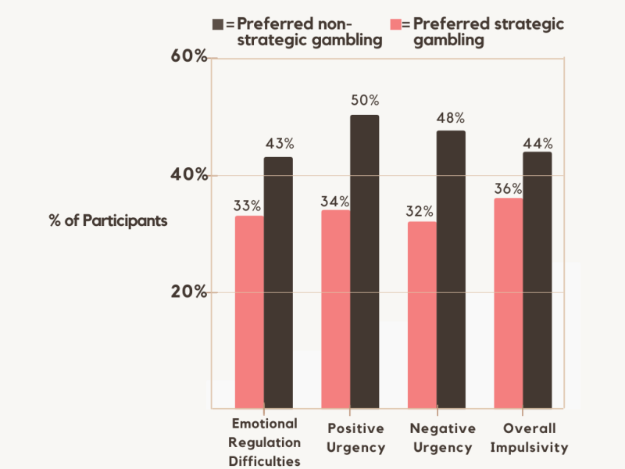The WAGER, Vol. 27(2) – Emotion regulation, impulsivity, game preference, and Gambling Disorder
Difficulties in emotion regulation (ER), such as emotional suppression or problems with identifying emotions, are elevated among individuals with Gambling Disorder (GD). Impulsivity, particularly the urgency dimension—or the tendency to behave more impulsively when experiencing very pleasant or unpleasant feelings—has also been associated with a higher risk of developing GD. This week, The WAGER reviews a study by Cristina Vintró-Alcaraz and colleagues that examined the relationship between emotion regulation and impulsivity, and the preferred type of gambling among individuals with Gambling Disorder.
What was the research question?
Are emotion regulation and impulsivity related to the type of gambling (i.e., strategic vs non-strategic) among treatment-seeking patients with Gambling Disorder?
What did the researchers do?
The researchers recruited 321 adults seeking treatment for Gambling Disorder at the Behavioral Addictions Unit at the Bellvitge University Hospital in Barcelona, Spain. Participants were divided into groups based on gambling preferences: strategic (e.g., preferring poker) and non-strategic (e.g., preferring slot machines). The researchers assessed emotion regulation using the Difficulties in Emotion Regulation Scale and assessed Impulsive traits/tendencies, including negative and positive urgency, using the UPPS-P Impulsive Behavior Scale. They calculated the percent of participants in the strategic and non-strategic groups who scored above the high-risk threshold for each outcome.
What did they find?
The strategic gambler group (n = 100) had higher education levels and was more likely to be employed. The non-strategic gamblers (n = 221) were older and included a higher proportion of women. Strategic gamblers were less likely to score above the high-risk threshold for emotion regulation difficulties, positive and negative urgency, and overall impulsivity than non-strategic gamblers (see Figure). Higher levels of emotion regulation difficulties (except the awareness dimension), and higher positive and negative urgency dimensions of impulsivity, were associated with Gambling Disorder severity.

Figure. Percentage of participants who scored above the higher risk threshold for emotion regulation difficulty, positive urgency, negative urgency dimension, and overall impulsivity. Strategic gamblers preferred games like poker and non-strategic gamblers preferred games like electronic gaming machines (EGMs). Click image to enlarge.
Why do these findings matter?
Understanding the role of emotion regulation and impulsivity is crucial to implementing more effective treatment for Gambling Disorder, as well as other mental health disorders. This study suggests that emotion regulation difficulties and impulsivity vary between strategic and non-strategic gamblers, and thus it is important for treatment plans to take these varying clinical profiles into account. For example, clinical approaches with promise for Gambling Disorder, such as cognitive behavioral therapy and motivational interviewing, can include customized treatment plans based on patients’ gambling game preferences, emotional regulation skills, and impulsivity tendencies.
Every study has limitations. What are the limitations of this study?
This study examined trait impulsivity specifically, while impulsivity is a construct composed of both trait impulsivity and state-based impulsivity, so some dimensions of this construct were not measured. Also, the participants’ current medications and comorbidities were not taken into account, even though these variables might have been associated with levels of impulsivity.
For more information:
Do you think you or someone you know has a gambling problem? Visit the National Council on Problem Gambling for screening tools and resources. For additional resources, including gambling and self-help tools, please visit The BASIS Addiction Resources page.
— Taylor Lee
What do you think? Please use the comment link below to provide feedback on this article.